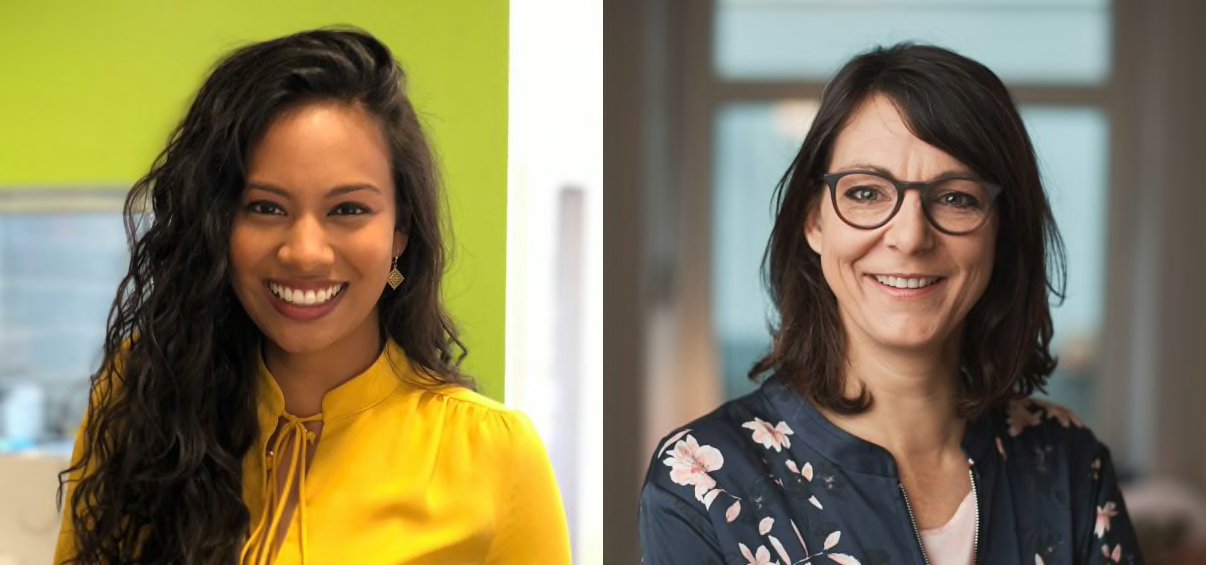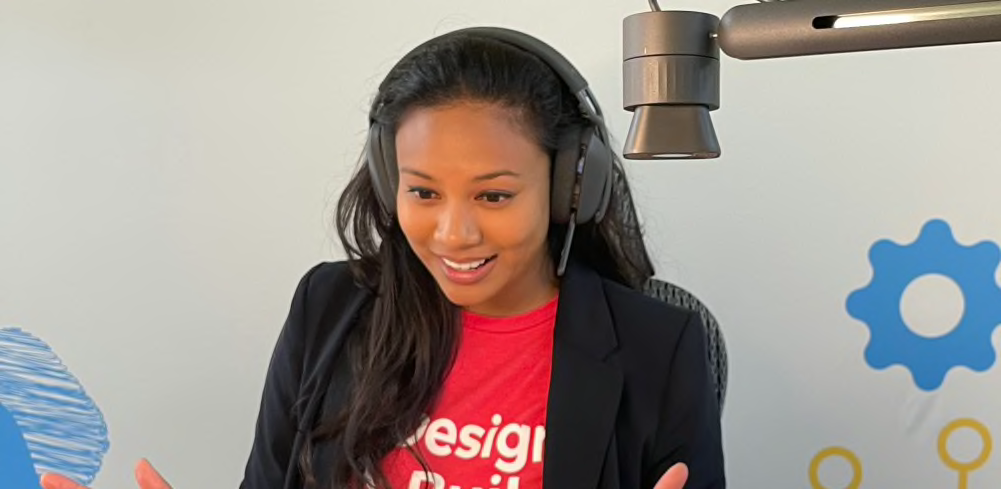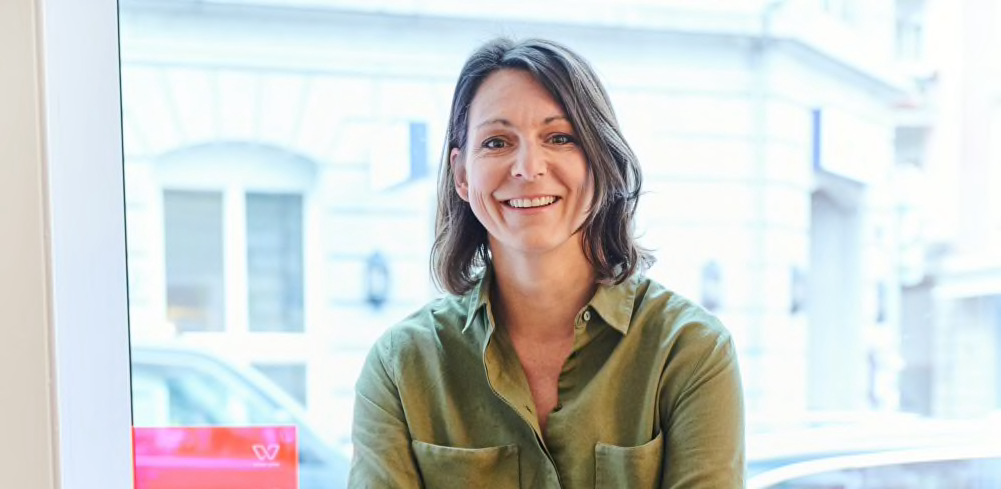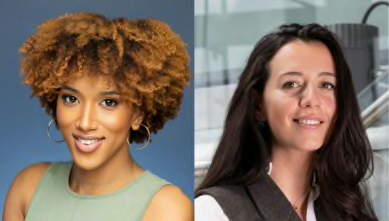Article | 5 min read
Across the World and Across Disciplines, Two Leaders Converge on Equity in STEM

The Logitech MX #WomenWhoMaster series now turns to a pair of business leaders who took an interest in STEM and converted it into progress toward a better world.
A mechanical engineer, Lavanya Jawaharlal grew up in the U.S., where she works today as president and co-founder of the tech education company STEM Center USA. In Switzerland, Nadia Fischer complemented her long standing passion for software building with knowledge on language AI and created Witty, an app that educates workers about inclusive language as they write.
Together, these entrepreneurs are striving to remove barriers to STEM education and professional opportunities, so that all people can make their voices heard and contribute to the advancement of their societies.

Q: Now that you’ve been through the process yourself, do you have any advice for a young woman who's looking to start her own business?
LJ: I often hear people telling entrepreneurs to plan everything out. But when I actually talk to small business owners, and when I think about my own experience, one of the best pieces of advice that emerges is if you have an idea you are passionate about, you should go ahead and do it. Don't wait for everything to fall perfectly in place, because it never will.
"There's always going to be a reason why you shouldn't pursue an idea. Whether that be funding, or logistics, or something else, there will always be uncertainty. If you have the idea, if you're passionate about it, then go ahead and execute."
Q: Fantastic. Now, imagine it's the year 2100, and the granddaughter of one of your STEM Center students is pursuing the same career as you. What do you want her career to look like or her future to look like?
LJ: I hope that she has equitable access to education. I remember in engineering classes in college, I would look around and see a room full of men, very few women, and even fewer women of color. And that has roots in experiences that happen way before students are in college. So I hope students in the 22nd century encounter a system built on core values of equitable education for all and education that looks responsive to their needs.
"The work we do to provide equitable education for students early on, today, will be repaid tenfold in the future. And I hope by 2100 we’re seeing the results of that work."

Just like Lavanya forged a unique path after getting her degree in order to start STEM Center USA, Nadia Fischer changed directions after university to apply artificial intelligence to the problem of achieving inclusive language in professional organizations.
Q: Did you have a mentor or a specific person who encouraged you and supported you when you took the leap from a career in policy to one in tech?
NF: Not really a specific person, but at the third company where I worked, everyone was very supportive. At that time, because I had switched careers, I was less far along than most people my age, but everyone I worked with said, "It doesn't matter. You're a pragmatic person, and you're trying to solve problems, and this is the right place for you." So they were very supportive. I think I gained the confidence that I can succeed in the tech industry during my time at that company. Before, I was always a little bit unsure, "Am I at the right place? Am I doing this right?" Also, they had a lot of women in technical professions and that helped. We were not this big exception, we were just professionals like everyone else.
Q: That’s great. Next, what would you say are the top skills that we should be teaching the next generation to set them up for success in this new world we're entering?
NF: Creativity. Because there are so many complex problems out there, and our school systems in many cases place too much emphasis on rote memorization instead of making the solutions. Also, self-confidence.
"We should be teaching people that they have what it takes to solve problems, we should teach them to take initiative, and we should teach them not to fear failure."
Lavanya and Nadia are leading the charge toward a future where STEM education is freely available and STEM professions harness the combined power of diverse minds.
To read the full interview with Lavanya and Nadia, go here.
Connect with Lavanya on LinkedIn and Instagram to learn more about how she’s transforming STEM education for K-12 students. Find Nadia on LinkedIn and Twitter to stay informed as she works to broaden STEM opportunities through language.
Women Who Master puts a spotlight on women who have made outstanding contributions to STEM fields. The goal of the series is to celebrate those contributions, inspire future leaders, and help close the gender gap in technology.
#WOMENWHOMASTER
MEET THE MASTERS AT THE FOREFRONT OF STEM

MARIJA MUSJA AND NIKITA WASHINGTON
This new feature in the Logitech MX #WomenWhoMaster series brings together two exceptionally creative leaders in technology who have a lot to say about passion and creativity in the industry.

Lauren Hasson
It started with an early interest in STEM that led her down the path of computer science, then evolved to Lauren Hasson launching an award-winning career development platform to inspire other women and equip them for success in tech.

Adora Nwodo
When Adora Nwodo was six years old, her family got a computer. That’s the day she found her calling. Today she is using her skills, experience, and interest in technology to help build the metaverse.

WOMEN WHO MASTER
Logitech MX is committed to spotlighting and supporting impactful initiatives and individuals that are disrupting the industry worldwide, to inspire girls and women to pursue a career or continue thriving in STEM.
With #WomenWhoMaster, our mission is to ignite an industry-wide movement that addresses the gender gap and unequal access to opportunities in tech and IT, once and for all.
